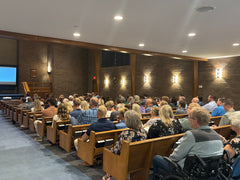Your cart is empty now.

Concerning the purpose of the Church Order
This is an extract from The Church Order Commentary, by by Idzerd van Dellen and Martin Monsma, pages 1-3, published by the RFPA.
_______________
No Christian can observe and study life and the world in which we live without seeing that God loves order. The seasons of the year, our own bodies, and all things created tell us, in spite of the mars and scars of sin, that the great Creator of all things is a God of order. The Bible, God’s special revelation, tells us the same thing emphatically.
Now God is ever true to Himself. Sublime harmony and order mark His triune being. Consequently God can do nothing in a haphazard, slipshod fashion. That would militate against His very essence. That would be ruinous in its effect upon His creation.
For these reasons the Church at Corinth is also admonished: “But let all things be done decently and in order” (1 Cor. 14:40). And it is for the maintenance of good order in the Church of Christ, and for the promotion of its true welfare, that “offices, assemblies, supervision of doctrine, sacraments and ceremonies, and Christian discipline,” have been instituted. For these same reasons our fathers of Reformation days accepted a limited set of rules regulating these several matters. These rules comprise our Church Order.
By maintaining well organized Churches with their, “offices, assemblies, etc.” we vary definitely from certain mystical, inner-light groups who neglect all these important matters and even stand opposed to them. Our fathers definitely disagreed with the Anabaptists of the sixteenth century on this score, and felt persuaded by Holy Writ to sponsor well organized Churches.
At the same time it should be remembered that it is not the purpose of the Church Order to force the Churches to walk its beaten path with arbitrary, fettering and chafing compulsion. The Church Order means to be regulatory. It means to regulate ecclesiastical life reasonably and with full maintenance of the rights of every congregation and of the individual members of the Churches. The Church Order is moral in character, not judicial. It is a regulatory set of rules, not a legalistic set of laws.
Regarding the expression “Church of Christ” in Article 1, it should be remarked that the Church Order sometimes speaks of “Church” in the singular (Kerk). Now the word “Church” in the Church Order always refers to a local congregation viewed as a definite organization. The plural “Churches” (Kerken) refers to a number of organized congregations. Usually it refers to all the Churches belonging to the denomination. The expression “Church of Christ” (Gemeente van Christus) is used to indicate the body of believers living in a certain region or country. It designates the body of Christ from its non-organizational aspect, and as scattered in various localities. And finally, the name “congregation” (de gemeente) is used to designate a definite group of believers living in one communion and organized into one particular church, although the term “congregation” in the Church Order also refers to the Church from its non-organizational aspect.[1] Concisely the matter stands thus as to Church Order usage:
Kerk—Church—Organized or instituted Church.
Kerken—Churches—Denomination or Federation of organized Churches.
Gemeente van Christus—Church of Christ—Sum total of believers living in various localities.
De gemeente—the congregation—definite group of believers living in one locality.
It is evident therefore that Article 1 thinks of the believers as found in various localities when it speaks of the Church of Christ, and more specifically of the believers belonging to our Christian Reformed denomination.
The Church Order considered from the aspect of its purpose may be said to fill a real necessity. To be sure a Church can exist without a Church Order but it cannot flourish and thrive properly without it. Furthermore, denominational harmony and cooperation require a definite set of rules, inasmuch as all cooperation requires an expressed basis. Besides, the Church Order is a constant guardian against wilfulness and abuse of power, which evils are ever ready to creep in to disturb the peace and progress of the Church.
[1] Joh. Jansen, Korte Verklaring van de Kerkenordening (1923), 3–4.
_______________
Also available in ebook format!
The content of the article above is the sole responsibility of the article author. This article does not necessarily reflect the opinions and beliefs of the Reformed Free Publishing staff or Association, and the article author does not speak for the RFPA.

Donate
Your contributions make it possible for us to reach Christians in more markets and more lands around the world than ever before.
Select Frequency
Enter Amount













